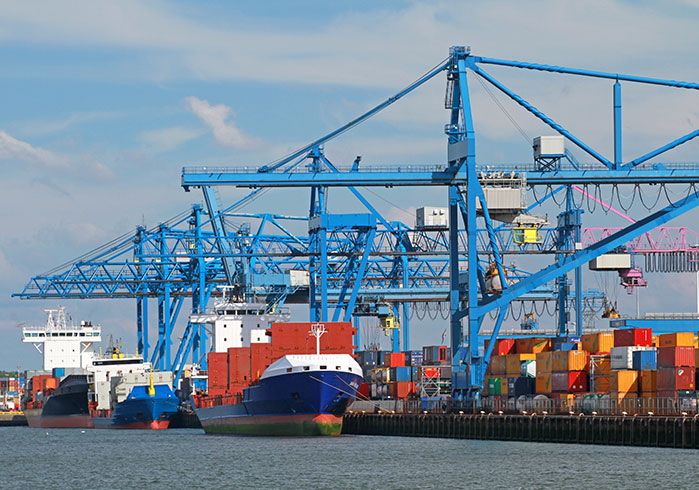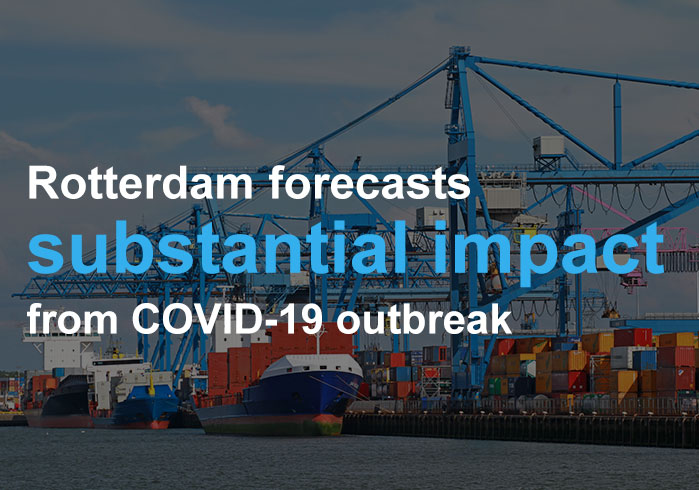
Authorities at Port of Rotterdam said last week that global disruption to the supply chains is not the only thing influencing these highly exceptional conditions. But they aren’t alone.
Rotterdam: Q1 effects of COVID-19
Rotterdam has already warned it is very likely they will see disruptive effects throughout their global supply chain in the form of a 10% to 20% year-over-year drop for container volume due to the Coronavirus. This is a devastating prediction, but Rotterdam is not alone in making it. This otherwise downtrodden prediction is one that echoes all the expectations that have been made by nearby rival Antwerp. Last week, Antwerp announced that they saw a 9.5% surge in volume in the first quarter and will invariably brace themselves for an impact to volume in the second quarter because of more coronavirus measures.
Rotterdam is the busiest container port in Europe and they have already reported a throughput decline for their first quarter of 4.7%. Normally the port has 3.5 million TEU passing through in but within the first three months, it is down 174000 TEU compared to the same time last year.
The drop during the first quarter was brought about by disruption to production and supply chains, restrictions on the movement of people, the subsequent tightening of border controls, and the closing of factories. Every port should expect to contend with similar measures, not just Rotterdam.
Concerning overall tonnage handled for the first three months of this year, Rotterdam throughput dropped 9.3% compared to last year where it was 123.8 million tons, but this year was only 112.4 million tons. Record highs, of course, were recorded for the same timeframe in biofuel and liquefied natural gas volume. It’s important to remember that roughly half of the containers that go through Rotterdam either come from or are headed to Asia.
This 9.3% throughput drop is almost the same as what Antwerp recorded. And the cargo growth at Rotterdam it’s also slowing down. Increased competition from Rivals throughout northern Europe is directly impacting the drop-in throughput. Cargo growth dropped by 5.7% hovering around 14.8 million TEU. Rotterdam is noting that one of the main attributing factors to this fluctuation is the weakening economies throughout Europe as well as declining trade with Asia.
While we can easily say that what’s happening is the direct result of these economic changes, these economic changes are a direct result of the coronavirus. The economic recessions that are taking place around the world are just beginning in places like Europe and America.
Industry recovery
Nations everywhere are waiting for an end to regional stay-at-home orders to stop the spread of the Coronavirus so that economies can restart. Terminals throughout Chinese shipping ports have seen greater throughput declines compared to their European and US counterparts. Factory closures and travel restrictions in China have significantly hampered the volume at the ports. Chinese ports became fully operational in March after they had dealt with the Coronavirus, but now that Coronavirus impact is spreading through Europe and America. Ports around the world are not likely to see very quick Improvement in volume anytime soon. It’s important to revise outlooks and be prepared for that downward change. Carriers have already planned withdrawals of large amounts of their capacity for the next few weeks with a lot of canceled sailings around the world, in fact, an average of 25%. It’s estimated that these canceled sailings will result in additional volume losses through the end of June. It is more likely that a very slow and gradual recovery will take place. The high cost of the pandemic on the global economy will limit the possibility of a massive rebound that everyone hopes may happen.
Advice for shippers
Shippers need to take the advice given by the Rotterdam Port Authority and recognize that even though these times are challenging and everyone is seeing substantial drops, this is just the beginning. Economies will continue to face strategic problems with the shipping industry. There are three global risks predicted through 2021 that will impact shippers. This includes the best-case scenario, the base-case scenario, and the worst-case scenario.
There is a 20% likelihood that the best-case scenario will take place, 50% for the base-case scenario, and 30% for the worst-case scenario. In terms of the overall continuing spread of COVID-19 on worldwide economies and on shipping demands, the best-case scenario states that the virus will peak and decline within the next two months. The base-case scenario states that it will peak and decline within the next four months in the northern hemisphere, but then it will cascade down to areas not yet at their peak. The worst-case scenario is that the virus re-emerges in places with the current outbreak level.
In terms of this impact on the global economy, the best-case scenario indicates that worldwide there is a V-shaped global economic recovery. With the base-case scenario, the one with a 50% likelihood, that recovery is a U-shaped global economic recovery. In the worst-case scenario, there is no economic recovery in 2021.
Wrapping up
In the end, Rotterdam has predicted large-volume hits and they are not alone. China has already dealt with the majority of its declines in the shipping industry as a result of things like closed factories and struggling economies but this is spreading In waves around the world and will slowly affect major economies everywhere. Things will be tight with a lot of decline for the next few months and potentially even longer.


